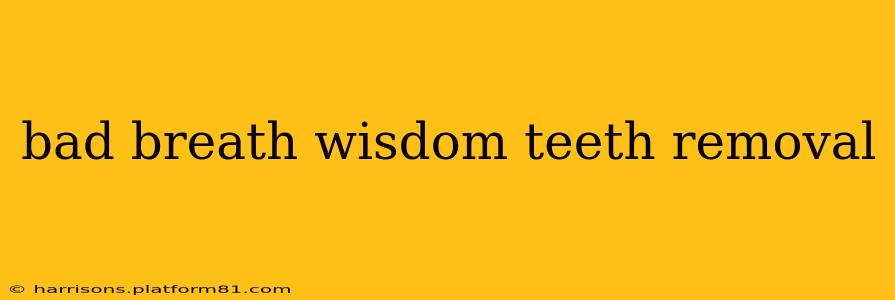Wisdom teeth removal is a common procedure, but it can sometimes lead to unpleasant side effects, including bad breath (halitosis). Understanding the causes, prevention strategies, and treatment options can help you navigate this post-surgical experience with greater comfort and confidence. This comprehensive guide will address common concerns and provide practical solutions to help you regain fresh breath.
Why Does My Breath Smell Bad After Wisdom Teeth Removal?
The most common reason for bad breath after wisdom teeth removal is the presence of blood and food debris in the extraction sites. The process of healing involves a complex interplay of factors that can contribute to unpleasant odors. Let's explore some of these:
- Blood Clots: The initial formation of blood clots is crucial for healing. However, decomposing blood clots can emit a metallic or foul odor.
- Food Particles: Food particles can easily become lodged in the extraction sockets, providing a breeding ground for bacteria.
- Infection: In some cases, infection can develop at the extraction sites, leading to a significantly worse odor. This is often accompanied by other symptoms like pain, swelling, and pus.
- Dry Socket: A dry socket, also known as alveolar osteitis, is a painful condition where the blood clot is dislodged or doesn't form properly. This exposes the bone and nerve endings, leading to significant pain and often a bad odor.
- Poor Oral Hygiene: Neglecting proper oral hygiene after surgery can exacerbate bad breath, as bacteria thrive in an environment of food particles and stagnant saliva.
How Long Does Bad Breath Last After Wisdom Teeth Removal?
The duration of bad breath after wisdom teeth removal varies depending on several factors, including the individual's healing process, oral hygiene practices, and the presence of any complications. In most cases, the unpleasant odor gradually diminishes within a week. However, if an infection develops or a dry socket occurs, the bad breath might persist for a longer period. If you're concerned about persistent bad breath, consult your oral surgeon or dentist.
How to Prevent Bad Breath After Wisdom Teeth Removal?
Proactive measures can significantly reduce the risk of developing bad breath after wisdom teeth removal. Here are some crucial strategies:
- Follow Post-Operative Instructions: Strictly adhering to your oral surgeon's post-operative instructions is paramount. This includes taking prescribed medications, maintaining a soft food diet, and avoiding vigorous rinsing or spitting.
- Gentle Rinsing: Use a prescribed antimicrobial mouthwash or a salt-water rinse as directed by your surgeon to gently cleanse the extraction sites. Avoid forceful rinsing that could dislodge the blood clots.
- Maintain Oral Hygiene: Brush gently around the extraction sites, avoiding direct contact with the wound. Use a soft-bristled toothbrush and focus on cleaning other areas of your mouth meticulously.
- Hydration: Drinking plenty of water helps keep your mouth moist and washes away food particles and bacteria.
- Diet: Avoid strong-smelling foods like onions, garlic, and spicy dishes, especially during the initial healing period.
What If I Have a Dry Socket After Wisdom Teeth Removal?
A dry socket is a serious complication that can lead to persistent bad breath, intense pain, and delayed healing. If you experience severe pain, a foul odor, or visible bone in the extraction socket, contact your oral surgeon immediately. They will likely recommend a treatment to alleviate the pain and promote healing, which may involve packing the socket with medicated dressing.
Can Bad Breath After Wisdom Teeth Removal Indicate an Infection?
Persistent bad breath, coupled with other symptoms such as swelling, increased pain, redness, and fever, could indicate an infection. Seek immediate medical attention if you suspect an infection. Early diagnosis and treatment are vital to prevent serious complications.
How Can I Get Rid of Bad Breath After Wisdom Teeth Removal?
While many instances of post-wisdom teeth removal bad breath resolve naturally with good oral hygiene, seeking professional guidance is always advisable if the problem persists. Your dentist or oral surgeon can provide tailored advice, prescribe medications if necessary (such as antibiotics to treat an infection), and assess the need for further intervention.
By following these prevention strategies and seeking professional help when necessary, you can minimize the risk and duration of bad breath after wisdom teeth removal, promoting a smoother and more comfortable recovery. Remember, communication with your dental professional is key to managing any post-operative complications effectively.
